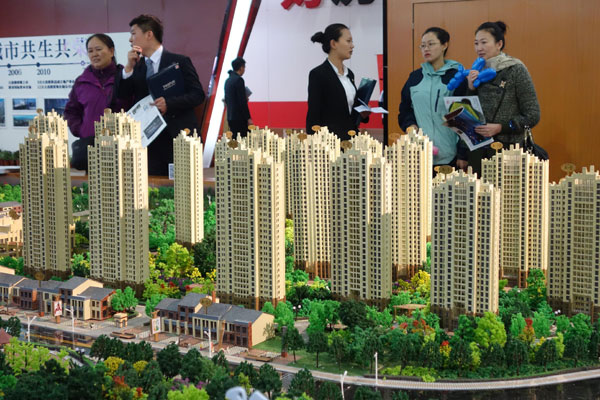 |
|
Residents in Dalian, a coastal city in northeastern Liaoning province, attend a housing promotion event. The domestic property market is cooling further, with the value of home sales dropping 7.7 percent year-on-year to 1.1 trillion yuan ($176.79 billion)in the first three months, contrasting with a surge of 69 percent a year ago. LIU DEBIN/CHINA DAILY |
More than half of the cities in the Yangtze River Delta region posted falling home prices during the first quarter. The slump was coupled with slowing transactions in the nation's top 10 cities, a report from a real estate consultancy showed.
The urban residential price index of the nation's 100 major cities, compiled by the China Index Academy - a research arm of the nation's largest property website Soufun - edged up 1.56 percent during the January-March period from the previous quarter but was 1.08 percentage points lower year-on-year.
 |
 |
Property investment, however, is still on the rise. From January to March, a total of 1.5 trillion yuan was poured into the real estate sector (including office and retail), up 16.8 percent year-on-year, with 1.05 trillion yuan pumped into the residential market, surging 16.8 percent year-on-year.
Ding Zuyu, executive president of E-House (China) Holdings, said the falling home prices in some cities may be the result of a seasonal decline during January and February, as home transactions tend to slow during the Lunar New Year holiday.
Meanwhile, first-tier and major second-tier cities, which had been the core growth engine of China's home market, experienced a substantial decline in home transaction volume, and this also caused the nation's average home price to fall, added Ding.
In the first quarter, average home price of the nation's top 10 cities saw smaller growth in both year-on-year and quarter-on-quarter terms from the October-December period of 2013.
The top 10 cities are Beijing, Shanghai, Guangzhou and Shenzhen (all first-tier cities), along with second-tier cities Chongqing, Wuhan, Chengdu, Tianjin, Nanjing and Hangzhou.
